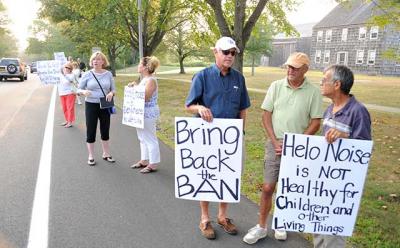Despite Curfew, Noise ‘Worse, Not Better’

While those afflicted by airport noise from helicopters and other craft using East Hampton Airport had hoped for relief after an overnight curfew was enacted in July, many told the East Hampton Town Board last week that the measure fell short, and that noise problems continued and had even grown worse this summer.
Speakers at board meetings last Thursday and on Sept. 1 pressed the board to continue efforts to resolve the conflict between growing numbers of flights to and from East Hampton and the residents, not only in East Hampton but from across the North and South Forks, who are disturbed by the planes’ sounds and vibrations.
Picketing outside Town Hall on Thursday night, they held a number of signs:
“Our Town. Their Noise. Why is that. $$$?”
“Seaplanes ARE Noisy.”
“Our Town. Our Skies. Our Health. Our Future.”
Inside Town Hall, board members got an earful. Though a package of airport use restrictions was enacted last spring by the board after an extensive effort to document the noise problem and lay an unassailable legal groundwork, the town was sued by an aviation group called Friends of the East Hampton Airport.
Judge Joanna Seybert of Federal District Court in Central Islip upheld an overnight curfew, from 11 p.m. to 7 a.m. for all planes, and from 8 p.m. to 9 a.m. for craft that fall into a “noisy” category based on Federal Aviation Administration standards, but she disallowed for the time being a third law that would have restricted summertime takeoffs and landings by noisy aircraft to one each per week.
“These very meager laws have not in any way mitigated the noise,” said Peter Wolf of East Hampton. “It’s gotten worse, not better. The laws did no good.” In fact, he and others said, they exacerbated the situation in some ways, such as compressing a larger number of flights into the daytime operating hours.
“This is by far the worst summer of noise in the 30 years that I have lived on Wireless Road,” said Sheryl Gold of East Hampton last Thursday night. She expressed appreciation for the board’s efforts, but begged it “to bring back our quality of life, our health, our sanity.”
While numerous speakers thanked the town board for its efforts, they pressed officials to keep the issue in focus.
All of the various other town issues and problems “do not come near the volume of complaints” that the airport instigates, Jim Mathews said. “There can be no doubt that this is a problem that needs to be dealt with decisively.”
“We have been through an historic effort over the last year and a half, analyzing the problem, listening to the public,” Town Supervisor Larry Cantwell said, adding that there should be no question about “the board’s resolve.”
“Nothing has changed; it’s worse than ever,” said one. The noise is still “unbearable,” another speaker said.
“We’ve got to be able to restrict these aircraft — they’re ruining our lives,” a Sag Harbor resident said.
“It’s become intolerable,” said a woman who lives near Georgica Pond in East Hampton.
“I’ve seen everything but Superman flying over my house, at lower and lower levels,” said Patricia Currie of Noyac. While helicopters may be maintaining lower altitudes, she said, “now we’ve got seaplanes. They’re noisy and they’re terrifying. They’re the new menace.”
Kathleen Cunningham, who heads the Quiet Skies Coalition but spoke as an individual, was emotional when speaking to the board. She also thanked board members for their actions. “But it’s hard,” she said. “It’s really hard on these folks, and it’s hard on me.” Residents, she said, need the board to make clear to aircraft operators that are disturbing the peace “that we are not abandoning our homes; that we are not abandoning our quality of life. I’m going to fight this fight until I have no more breath left in me.”
“So please keep at it, and know we’re behind you,” she said.
“At approximately 5 this afternoon, I filed complaint number 74,296,” Tom MacNiven said. “Things are not better. We still have a lot of work to do.”
A member of the town’s airport advisory committee, he suggested that the town seek another outside attorney to advise it on airport matters, and replace Peter Kirsch, the current counsel. “I don’t think he’s helping you,” Mr. MacNiven said.
Supervisor Cantwell said that once airport data from the summer has been compiled it will be posted on the town website “for the public to see and review. And we will do a formal review ourselves.” Efforts to tally information regarding complaints, landings and takeoffs, summonses for curfew violations, and so on are under way.
The board will schedule at least one public meeting to present and discuss the results, the supervisor said. “And we will be looking at our options when that review is completed.”
Mr. Cantwell said that one-trip-per-week restriction that the town was enjoined from enacting was the “most significant” in the package of airport restrictions passed by the board.
But, he said, Judge Seybert’s lengthy opinion nonetheless represented a “significant victory” for the town. It acknowledged, he said, that “we have rights to restrict” airport traffic, based on a documented problem of noise.
“We know that the level of relief that we hoped to achieve was not realized,” he said. “And we’re not done with it. Our work is not done, and we know that, and we will continue.”
